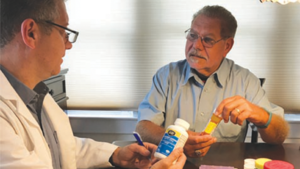Do you want to better understand how medications affect a person’s health and ability to function? The Geriatric 5M’s include Medication, Mind, Mobility, Multi-complexity and Matters Most making it easier to address the issues facing older adults. Current best practice in geriatric physical therapy includes the 5M’s framework in the patient/client management model where each M is specifically addressed individually and how all the M’s interact with each other. Medications have both positive and negative effects which influence mobility, and the mind. By integrating the Medication M into practice, patient safety may be optimized, function improved, and better outcomes achieved. Many medications increase the risk of falling by causing dizziness, orthostatic hypotension or delirium; or enhance or interfere with ADL and IADL function. Addressing the Medication M, therapists have the greatest opportunity to improve function when interfering medications are identified and addressed.
Day 1 (Eastern Time Zone)
9:00AM Pre-Test and Introduction – Background, Medical Errors, IOM “To Err is Human Report”, APTA/AOTA Position Statements, Regulations, Therapist role in Medication Safety, Medication and Physical Function. Case Scenario – problem solving – fall etiology
11:00AM Break
11:15AM The Geriatric 5M’s and the Patient/client management model examination and evaluation; Small Group Activity – history and medication review; Definitions: Pharmacology Basics, Pharmacokinetics, Pharmacodynamics, Drug Use in Older Adults, Common Adverse Drug Reactions (GI symptoms, Falls/Dizziness, sedation, confusion, fatigue and weakness). Small Group Activity – Assessment tools – Delirium, Dementia, Depression, Falls/Dizziness, Orthostatic Hypotension, Non-pharmacological interventions for Orthostatic Hypotension
1:30PM Working Lunch
2:00PM Pain Meds: Opiates, Non-Steroidal Anti-inflammatory Drugs, Tylenol, Corticosteroids, Gabapentinoids, Antispasm medications.
4:30PM Psychotropics: Depression, Anxiety, Sedatives, Mood stabilizers.
5:00PM Break
5:15 PM Small Group Activity – Assessment tools – Activity Intolerance/Endurance, Strength, Sleep, Anxiety and Pain.
6:30 PM Interventions – Non-pharmacological interventions for sleep promotion and anxiety management
7:00 PM Adjourn
Day 2 (Eastern Time Zone)
9:00AM Cardiac Medications, Anticoagulant Medications, Hyperlipemia Medications, Non-pharmacological interventions to reduce blood pressure and lower cholesterol. Small Group Activity – Assessment Tools for DVT and Statin-related myalgia – Wells Criteria for DVT, VTE management; Clinical Practice Guidelines; Small Group Activity – Medication Review and Reconciliation Process. Case Scenarios.
11:00AM Break
11:15AM Pulmonary Medications, Diabetic Medications, Osteoporosis Medications. Non-Pharmacological Interventions for diabetes and osteoporosis. Small Group Activity – Clinical Decision Making – Case Scenarios
1:30PM Working Lunch
2:00 PM Parkinson Medications, Other Medications (Metabolic, Cancer, Anemia, Antiviral/ Antibiotic, Neurological, Ortho), Drug- Drug Interactions
3:30PM Appropriate use of Medications in the older adult population – Use of the Updated BEERS Criteria (2019). Multi-complexity
4:30PM Break
4:45PM Small Group Activity – Case Scenario – Medication Reconciliation
5:45PM Dietary Supplements, Alcohol, Drug-Food Interactions. Video – Medication Reconciliation for an older adult
6:30PM Addressing What Matters Most and Post Test Review, Questions & Answers
7:00 PM Adjourn
Upon completion of this seminar, participants will be able to:
- Incorporate the Geriatric 5M’s into clinical practice by addressing medications, mind, mobility, multi-complexity and matters most.
- Define pharmacodynamics, pharmacokinetics, polypharmacy, medication errors, and adverse drug events.
- Explain the federal regulations pertaining to medications and scope of practice.
- Evaluate for polypharmacy and identify medication effects impacting function with older adults.
- Demonstrate use of the Beers List to identify potentially inappropriate drug use in the older population.
- List the commonly prescribed medications (prescription and OTC), their indications and side effects.
- Identify adverse drug reactions, side effects, and intended effects of the medications older adults take.
- List the steps involved in and perform a hands-on medication review and reconciliation process.
- Differentiate positive and negative medication effects on physical functioning, pain, endurance, strength, anxiety, depression, balance and risk for falling.
- Prescribe a non-pharmacological therapy program to reduce blood pressure, lower cholesterol and improve depression, anxiety and cognition.
EDUCATIONAL CREDIT: A certificate of attendance for 20 contact hours of educational activity (20 CEUs or 2.0 CEUs depending on how your Practice Act determines CEUs in your state) will be awarded to registrants upon completion of the seminar. Great Seminars and Books is an Approved CE Provider for PTs and PTAs in OK, NY, IL, CA, TX, and NM and this course provides 20 contact hours of continuing education. This course is approved for PTs and PTAs in LA, MS, NJ, OH, WI, OK, and MD for 20 Contact Hours. This course is approved by the Florida Physical Therapy Association for 24 contact hours. Approval Number: CE25-1270223. Our courses also meet the guidelines for approval in TN, PA, SD, MI, AL, VA, MO, IN, AZ, DE, GA, NH, OR, RI, UT, VT, WY and MO. Courses are accepted for CEUs in NE, ID, MT, WA, CT, IA, and ND. If you do not see your state listed, please give our office a call.
Great Seminars and Books is an AOTA Approved Provider of professional development. Course approval ID# 11569. This live, distance learning (independent), and distance learning (interactive) course is offered at 2.0 CEUs, intermediate educational level, for categories of Foundational Knowledge, OT Service Delivery, and Professional Issues. The assignment of AOTA CEUs does not imply endorsement of specific course content, products, or clinical procedures by AOTA. Expires 3/15/30. This course is approved by the Florida Board of Occupational Therapy for 20 contact hours.
This course is not approved by ASHA or Board of Certification.
Your tuition may be tax deductible. Any reference to or mention of state rules or regulations concerning continuing education requirements are true and accurate to the best of our knowledge at the time of print. If you have questions, please contact your board or regulating body.
If you do not see your state listed, please give our office a call at 877 794 7328.
WEBINAR
A webinar is live, interactive video course delivered over the Internet to your computer. You will be able to see, hear and interact with the course presenter. This live, webinar will utilize live instruction, demonstrative videos, power point slides and more. You will have an opportunity to ask questions during the seminar. A comprehensive handout will be made available to you after you register for the webinar. In many courses, demonstrative video will be used to further enhance your learning experience. All written content used in the presentation will also be made available to you for your personal use (Power Point Slides, Reference Materials etc.).
Financial Disclosure: Kenneth L Miller, PT, DPT, PhD, FNAP, GCS, CEEAA is a lecturer for GREAT Seminars. He receives payment from GREAT Seminars for the presentation of this course.
Nonfinancial Disclosure: No relevant nonfinancial relationship exists.
Content Disclosure: This course does not focus solely on any specific product or service.
Both Days - 20 contact hours
March 22-23, 2025 - $445.00
Day 1 Only - 10 contact hours
March 22, 2025 - $225.00
Day 2 Only - 10 contact hours
March 23, 2025 - $225.00
A post-test will be given at the end of Day 1 for the Day 1 materials and a Post-Test will be given on Day 2 for the Day 2 materials. A post-test score of 70% or more is considered passing. Scores of less than 70% indicate a failure to understand the material and the test will need to be taken again until a passing score has been achieved. For each day attended, you will receive a certificate of completion for 10 contact hours. If you attend both days of the Live Webinar, you will receive a total of 20 contact hours. Live Webinars allow presenter and participant interaction. The exam and course evaluation for these courses must be completed within 7 days of the event.

